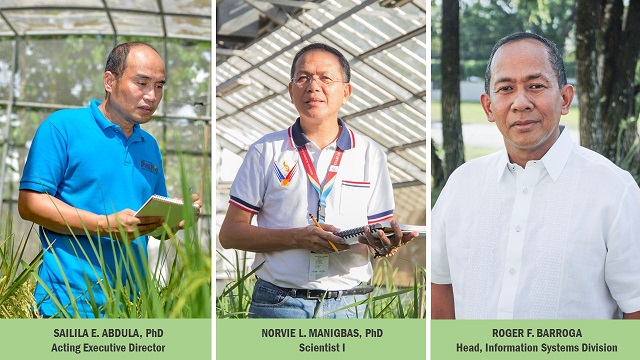 President Rodrigo Roa Duterte is set to confer the highest awards in public service to three PhilRice staff in a fitting ceremony at the Malacañang Palace, Sept. 27.
President Rodrigo Roa Duterte is set to confer the highest awards in public service to three PhilRice staff in a fitting ceremony at the Malacañang Palace, Sept. 27.
Screened by the Civil Service Commission (CSC) for their exemplary performance as outstanding government workers, PhilRice Acting Executive Director Sailila E. Abdula and Scientist Norvie L. Manigbas have been chosen as two of this year’s Presidential Lingkod Bayan Awardees. Meanwhile, Information Systems Division Head Roger Barroga is one of this year’s CSC Pagasa Awardees.
Abdula helped develop tungro-resistant rice varieties such as NSIC Rc 120 and Rc 226 to help manage the disease in Southern Mindanao. These varieties were released when he was the branch director of PhilRice Midsayap in North Cotabato.
He was also recognized as Outstanding Rice Scientist of the Philippines by the ASEAN Rice Science and Technology Ambassadors Award Search Committee in 2017.
Abdula is a Maguindanaon from West Patadon, Matalam, North Cotabato. In 2012, he obtained his PhD in agriculture, major in plant genetics from Chungbuk National University in Korea. He also finished his Master in Development Management degree in the Development Academy of the Philippines while his master’s degree in plant breeding in UP Los Baños.
Manigbas, one of the seven DOST-conferred scientists at PhilRice, is also the recipient of the 2018 Regional Gawad Saka Award for Outstanding Agricultural Scientist in Central Luzon.
He is known for his research in breeding rice varieties at PhilRice and International Rice Research Institute. His team led the development of the first released direct-wet seeded rice variety, NSIC Rc 298, which is now grown nationwide. Currently, he has five patents of rice genotypes he helped develop with his team at the Institute.
Manigbas finished his PhD in Agronomy (Crop Physiology and Plant Breeding) as a scholar of the Philippine Sugar Research Institute where he served for four years working on molecular markers in sugarcane. After his PhD, he was accepted as Post-doctoral Fellow at the Functional Crops Division, Rural Development Administration, in Miryang, South Korea. He is from San Agustin 2, Naujan, Oriental Mindoro.
Meanwhile, Barroga was the Deputy Executive Director for Administration in 2016-2017. He leads FutureRice, a program that explores ways to increase current rice output using practical cutting-edge technologies. He was the former director of the Open Academy for Philippine Agriculture (OpAPA), a consortium of stakeholders that enabled the Philippine agriculture benefit from modernized ICT. OpAPA was the recipient of the 2010 International Prize for Pioneering Human Development Projects awarded by the the Arab Gulf Programme for Development (AGFUND).
Barroga holds Master’s degree in Development Communication from the University of the Philippines Los Baños.
PhilRice staff were also recognized by CSC Region 3 for their outstanding performance in public service during the Honors and Awards Program held in San Fernando, Pampanga, Sept. 12.
Regional Winners:
Jonathan M. Niones, PhD, Chief Science Research Specialist, Presidential Lingkod Bayan Award – Individual Category
PhilRice Genebank, Ms. Marilyn S. Ferrer (Team Leader), Presidential Lingkod Bayan Award – Group Category
Regional Nominees:
Mr. Jaime A. Manalo IV, Senior Science Research Specialist, Presidential Lingkod Bayan Award – Individual Category.
Ms. Rosaly V. Manaois, Senior Science Research Specialist, CSC PAGASA Award – Individual Category
Riza G. Abilgos-Ramos, Supervising Science Research Specialist, CSC PAGASA Award – Individual Category




